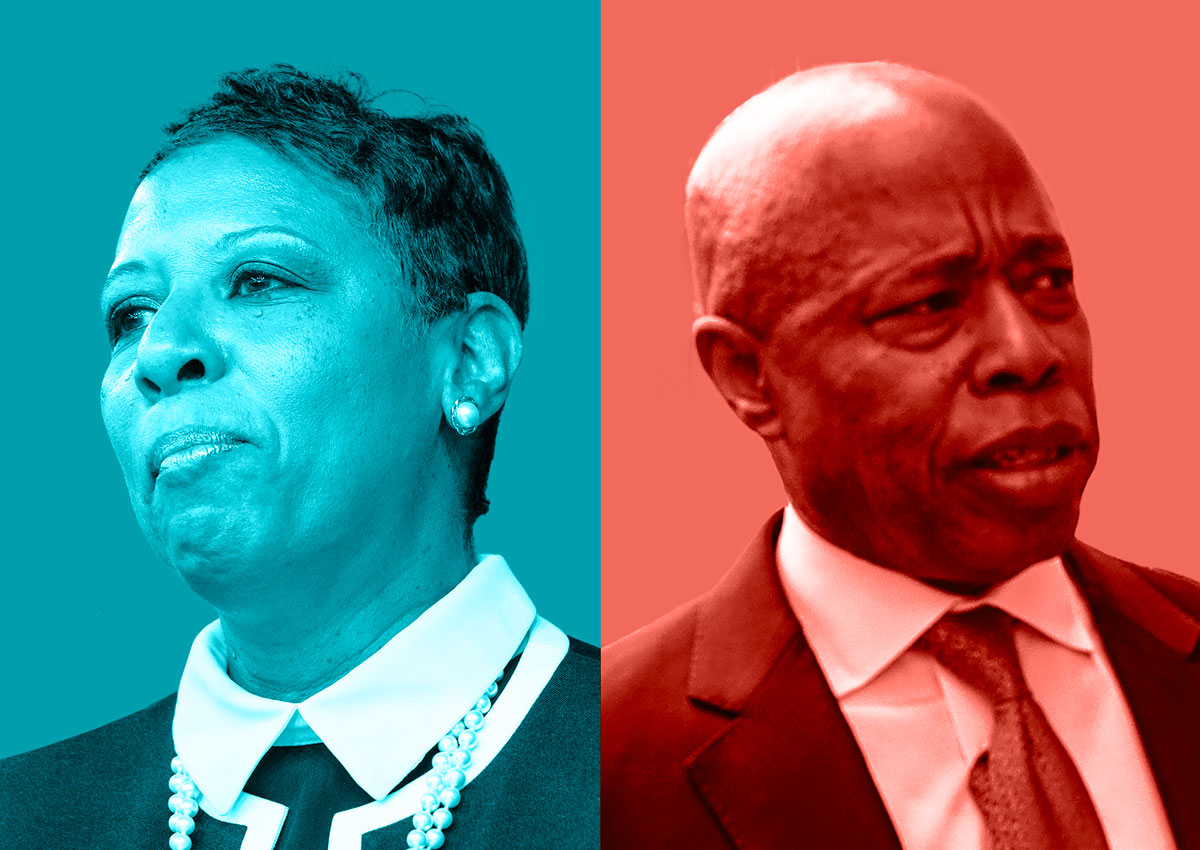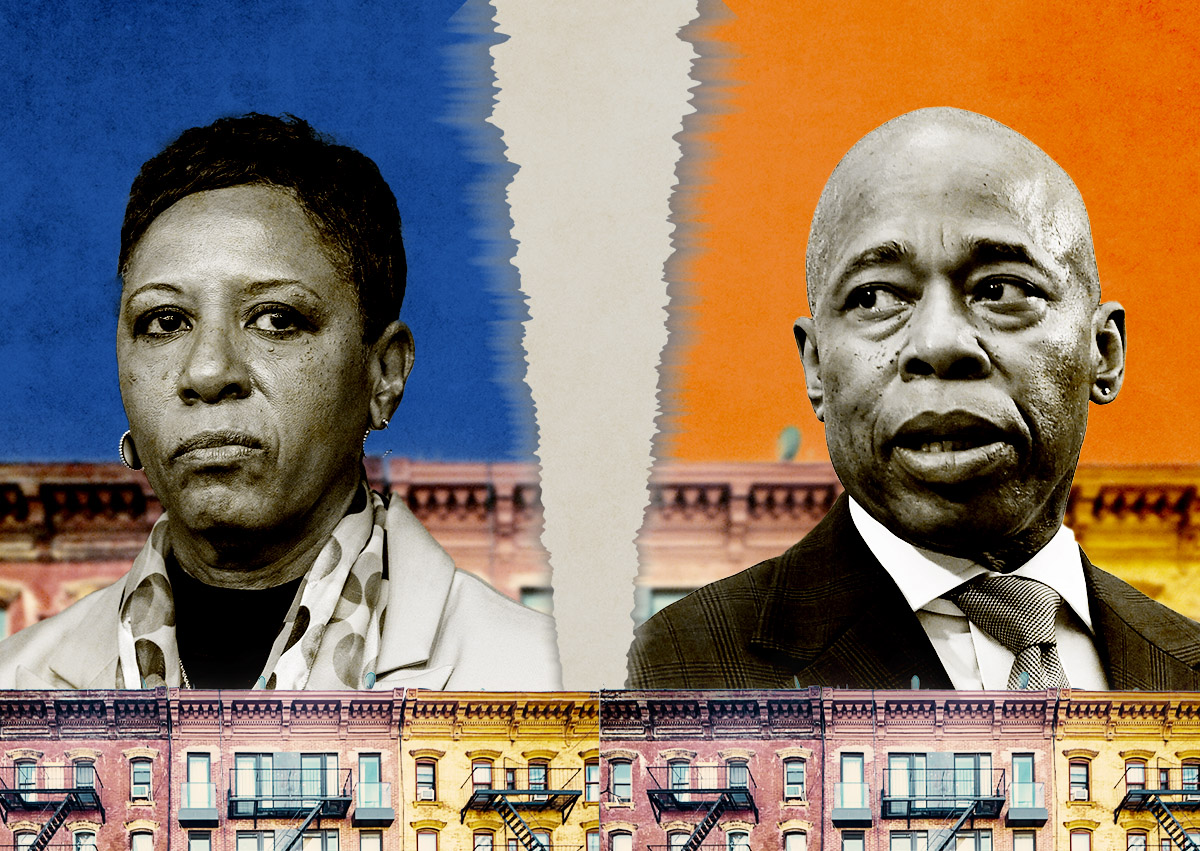Increasing housing voucher access in New York City may seem uncontroversial, a rare policy that enjoys support among tenants and landlords. But it has blown up the relationship between the Mayor Eric Adams and City Council, who are now likely taking their battle to court.
Thursday, the City Council overrode the mayor’s veto of four bills that expand eligibility for the City Fighting Homelessness and Eviction Prevention Supplement, or CityFHEPS. It was the first veto override since the Bloomberg administration: In 2013, the council upheld two measures ramping up oversight of the New York City Police Department and its use of stop-and-frisk.
City Hall has not yet revealed its next move, but a lawsuit appears imminent. During a briefing on Wednesday, administration officials would not confirm that they planned to file a suit challenging the bills, but emphasized that vouchers are administered by the Department of Social Services rather than a legislative process, suggesting that the city may challenge the council’s legal authority to change the voucher program.
In a statement after the vote, the mayor said his administration is “reviewing our options and next steps.”
“Unlike the Council, we do not, however, believe that New Yorkers should spend $17 billion on a package of bills that would put New Yorkers in shelter at the back of the line for a CityFHEPS voucher and make it harder for them to find permanent housing,” the mayor said. “We will continue to do all that we can to build more housing and tackle decades of exclusionary zoning policies that have prevented our city from building an adequate housing supply.”
Council leaders say the bills will cost far less, and some advocates say they may save money by reducing homeless shelter costs.
One of the measures expands income eligibility for vouchers: Instead of 200 percent of the federal poverty level, or $60,000 for a family of four, the upper limit would be changed to 50 percent of area median income, or $70,600.
Another vetoed bill repealed a rule requiring individuals and families to spend at least 90 days in homeless shelters before they can apply for CityFHEPS. The mayor signed an executive order similar to that measure, though it added work requirements. The other two measures sought to expand voucher eligibility to those at risk of homelessness or eviction and help low-income tenants pay utilities.
The mayor has argued that the measures will be too costly — $17 billion over five years — and increase competition for housing among the city’s existing 20,000 voucher holders. The City Council has challenged the mayor’s cost estimates, putting the total cost closer to $11 billion. An analysis by the nonprofit Women in Need found that the bills could save the city $730 million each year.
“The underlying truth is that homelessness comes at a high cost to New Yorkers. Period,” City Council Speaker Adrienne Adams said during a press conference ahead of Thursday’s vote.
The Citizens Budget Commission urged the Council not to override, arguing that the voucher program is already under budgeted. The city has budgeted $280 million for vouchers in fiscal year 2024, even though the program cost $421 million in the previous year.
The bills received support from some in the real estate industry, including the Real Estate Board of New York, which testified in favor of the measures in January. When asked about the measures on Thursday, the trade group responded with a statement that did not wade into the fight between the Council and mayor.
“New York City needs a significant increase in housing supply and a stronger housing voucher system,” the group said. “We are committed to working with all stakeholders on solutions to address these issues.”
Jay Martin, executive director of the Community Housing Improvement Program, said lawmakers have good intentions but “need to ensure housing providers are included in the conversations to improve the system to make it work.”
“Rental assistance is the only viable solution for affordability until enough housing is built in this city, but an unfunded voucher system is as pointless as no voucher system at all,” he said in a statement. “CityFHEPS vouchers are often unreliable, unfunded and subject to bureaucratic delays.”
He recently tweeted that a voucher holder was denied an apartment when an inspection found the tenant upstairs had placed an air conditioner on the fire escape.
This is not Adams’ first veto, but it is the first major showdown with this cohort of Council members. Ahead of Thursday’s vote, the prime sponsors of the voucher bills applauded Adrienne Adams for standing up to the mayor.
Council member Tiffany Cabán called the mayor’s approach to housing “disastrous,” pointing to rent increases approved by the City’s Rent Guidelines Board, as well as budget cuts to the city’s Department of Housing Preservation and Development.
“The mayor’s City of Yes, appears to be a yes to big real estate and a big no to working-class New Yorkers,” she said.
Read more



